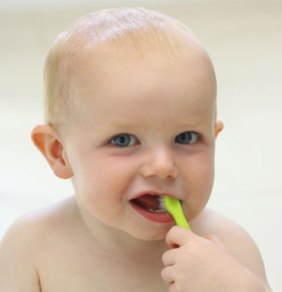ORAL CARE FOR INFANTS
Dental care is important for children and adults, but what about baby teeth?
Teeth and gum care should begin even before the first baby tooth appears. Baby teeth are very important to your child’s health. They help him or her chew, speak and smile. They also hold space in the jaws for permanent teeth that are growing under the gums.
When a baby tooth is lost too early, the permanent teeth can drift into the empty space and make it difficult for other adult teeth to find room when they come in. This can make teeth crooked or crowded. That’s why starting infants off with good oral care can help protect their teeth for decades to come.

Start cleaning your baby’s teeth twice a day as soon as you see his first little tooth bud emerging. If you start early, your baby will get used to having his teeth cleaned. Teeth start appearing between 4 months and 7 months. When your baby starts teething, you may notice that he or she will start to drool more or may want to chew on things. The first teeth to come in are the bottom front. Teething may be painless, but sometimes it can make babies uncomfortable and fussy. You can give your baby a cold teething ring or a cold wash cloth to chew or suck on or rub your baby’s gum with a clean finger. At the age of 2 your child should have 20 baby teeth.

If you give your baby a bottle, always hold the baby when you feed him or her. Do not let your baby fall asleep with a bottle. The remaining milk in your baby’s mouth can cause tooth decay (baby bottle decay). A damp wash cloth can be used to wipe your baby teeth if he falls asleep with a bottle. Stop giving your baby a bottle when he or she is 1 year old. Do not let your baby walk around with a Sippy cup unless it has only water in it.
Before your baby’s first birthday he or she should visit the dentist. It is better for your child to meet the dentist and see the office before he or she has a tooth problem.


